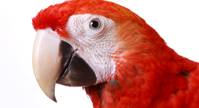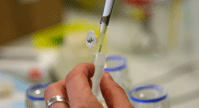Canine Bob Tail (Short Tail)
Description:
This test enables you to identify if a dog will have a naturally long or short tail. This test can also identify if the dog's tail is naturally short or if it has been docked. This can be important when breeding two short tailed dogs together.
The condition known as "bob-tail" or "short tail" is caused by a mutation in the Brachyury gene (a gene that codes for an important protein). The inherited trait is autosomal dominant. This means that a dog only has to carry a single copy of the gene in order for the dog to have a bob-tail. Dogs that carry one (BT/bt) or two copies (BT/BT) of the mutation will have a natural short tail. Dogs with two copies of the normal gene (who are bt/bt) will have normal tail length.
In the homozygous state (BT/BT), the Brachyury mutation is lethal in utero. For this reason, breeding two dogs with the bob-tail gene generally results in somewhat reduced litter sizes. This is important to realize when breeding short-tailed dogs with one another.
Bob Tail Testing:
Animal Genetics currently offers a test to determine the number of copies of the recessive bob-tail allele a dog carries. Dogs can be DNA tested at any age.
Sample Type:
Animal Genetics accepts buccal swab, blood, and dewclaw samples for testing. Sample collection kits are available and can be ordered at Canine Test Now.
Testing is Relevant for the Following Breeds:
Australian Shepherd, Australian Stumpy Tail Cattle Dog, Austrian Pinscher, Bourbonnais Pointer, Brazilian Terrier, Brittany Spaniel, Croatian Sheepdog, Danish Farm Dog, Swedish Farm Dog, Karelian Bear Dog, Mudi, Polish Lowland Sheepdog, Pyrenean Shepherd, Savoy Sheepdog, Schipperke, Spanish Waterdog, Swedish Vallhund, Jack Russel Terrier.
Results:
Animal Genetics offers DNA testing for dominant BT allele. The genetic test verifies the presence of the mutation and presents results as one of the following:
| BT/BT | Lethal | The dog carries two copy of the mutant gene. This condition is lethal in utero. |
| BT/n | Short Tail | The dog carries one copy of the normal gene and one copy of the mutant gene. The dog has a natural short tail. Heterozygous dogs can pass the mutation to their offspring with a probability of 50%. |
| n/n | Normal Tail | The dog has two copies of the normal gene and will have a normal tail. |
Submit a Sample for Testing:
To submit a sample for testing please go to Canine Test Now.
To order a sample collection kit please go to Order Sample Collection kits.
Cost per sample is $40.00. Please see our Canine Fee Schedule for all test rates.










